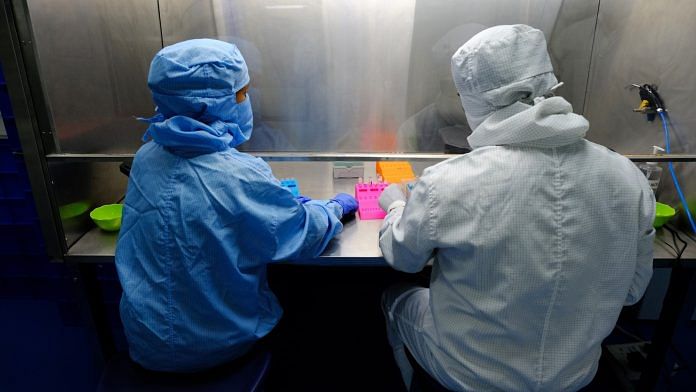New Delhi: A new study claims to have found higher incidence of Covid-19 antibodies in healthcare workers employed at non-Covid hospitals than in facilities designated to treat the disease.
The sero-prevalence study has been conducted by Eyebetes Foundation, a charitable foundation working towards reducing diabetes-caused eye ailments, including blindness.
Involving 800 healthcare workers, the study also suggests that ancillary workers such as cleaners, porters, ward boys, laboratory technicians, ward clerks, and administrative and security staff, face a much higher risk of infection than doctors and nurses.
The aim of the study, which was made public Wednesday, was to evaluate the Covid-19 exposure among healthcare workers, who constitute the frontlines of the battle against the pandemic.
Subjects included 200 doctors, 300 nurses and 300 ancillary workers from Mumbai’s largest government hospitals – JJ Hospital, GT Hospital and St George’s Hospital. JJ Hospital, a non-Covid facility, provided 400 samples, while GT and St George’s hospitals, which are dedicated Covid facilities, gave 200 samples each.
According to the study, 11.1 per cent of the healthcare workers studied tested positive for Covid-19 antibodies. This included asymptomatic people as well as those who had been tested and treated. This number, the researchers noted, was much lower than in countries like the UK, where they said a study had found Covid antibody presence in 45 per cent of healthcare workers tested.
Among the samples from JJ Hospital, the study said, 13.5 per cent had Covid antibodies. The share stood at 8.7 per cent for Covid facilities.
The study also found 7 per cent of its participating doctors and 6.8 per cent of nurses to have Covid-19 antibodies, while the share was 18.5 per cent among ancillary healthcare workers.
The researchers claim this is a one-of-its-kind sero-surveillance study, saying in an accompanying press note that it has been submitted to The Lancet journal for peer-review and possible publication.
Also Read: One in four people in Delhi infected by Covid till first week of July, sero survey finds
Risk for ancillary workers
Dr Nishant Kumar, lead author and founder of the Eyebetes Foundation, said “complacency” may be a possible explanation for the higher incidence of Covid antibodies among healthcare workers at non-Covid facilities.
“A possible reason for the increased sero-prevalence in non-Covid hospitals could be the false sense of security and complacence arising from the misconception that the healthcare workers are working in a non-Covid-19 hospital, and are therefore safe,” he told ThePrint. “This misconception may lead to relatively less stringent adherence to policy regarding social distancing and use of PPE.”
The study’s findings about ancillary workers in hospitals also being at great risk of infection calls for prevention measures and higher testing among them, the researchers said.
Study co-author Dr Shibal Bhartiya, senior consultant, ophthalmology, Fortis Memorial Research Institute, said ancillary workers — “affectionately called ‘mamas’ and ‘mausis’” — are the “backbone of patient care and cannot be expected to socially distance from patients”.
“We need to train them and have more frequent testing amongst this group so that those who get the infection can be treated and recover fully before returning to patient care,” she added in a press note accompanying the study.
Also Read: 57% of Mumbai slum dwellers were exposed to Covid, developed antibodies, finds sero survey



